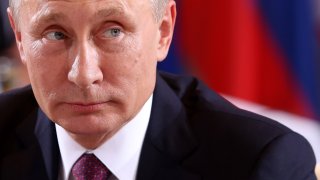
President Vladimir Putin announced Wednesday that Russia will demand that “unfriendly'' countries pay for Russian natural gas exports only in rubles from now on.
Putin told a meeting with government officials that “a number of Western countries made illegitimate decisions on the so-called freezing of the Russian assets, effectively drawing a line over reliability of their currencies, undermining the trust for those currencies.”
“It makes no sense whatsoever," Putin added, "to supply our goods to the European Union, the United States and receive payment in dollars, euros and a number of other currencies. As a result, he said he was announcing “measures” to switch to payments for “our natural gas, supplied to so-called unfriendly countries” in Russian rubles.
The Russian president didn’t say when exactly the new policy will take effect. He instructed the country’s central bank to work out a procedure for natural gas buyers to acquire rubles in Russia.
We're making it easier for you to find stories that matter with our new newsletter — The 4Front. Sign up here and get news that is important for you to your inbox.
Economists said the move appeared designed to try to support the ruble, which has collapsed against other currencies since Putin invaded Ukraine on Feb. 24 and Western countries responded with far-reaching sanctions against Moscow. But some analysts expressed doubt that it would work.
“Demanding payment in rubles is a curious and probably ultimately ineffective approach to attempting an end run around Western financial sanctions,’’ said Eswar Prasad, a professor of trade policy at Cornell University. “Rubles are certainly easier to come by now that the currency is collapsing. But exchanging other currencies for rubles will be quite difficult given the widespread financial sanctions imposed on Russia.
“The hope that demanding payment in rubles will increase demand for the currency and thereby prop up its value," Prasad added, "is also a false hope given all the downward pressures on the currency.’’
U.S. & World
The day's top national and international news.
Neil Shearing, group chief economist at Capital Economics, said: “It’s not an obvious move to me, since the (Russian) economy needs a supply of foreign currency in order to pay for imports — and energy is one of the few sources left."
This is a live update. Click here for complete coverage of the crisis in Ukraine.



